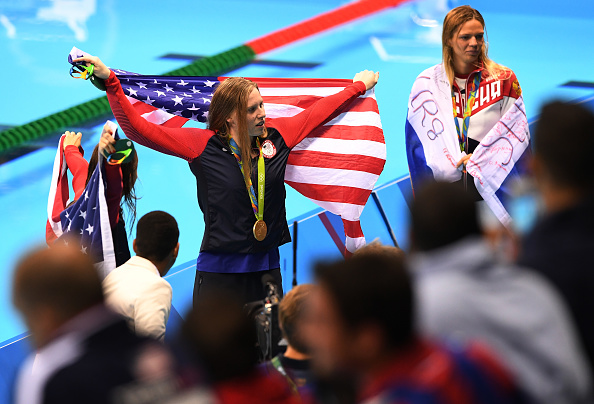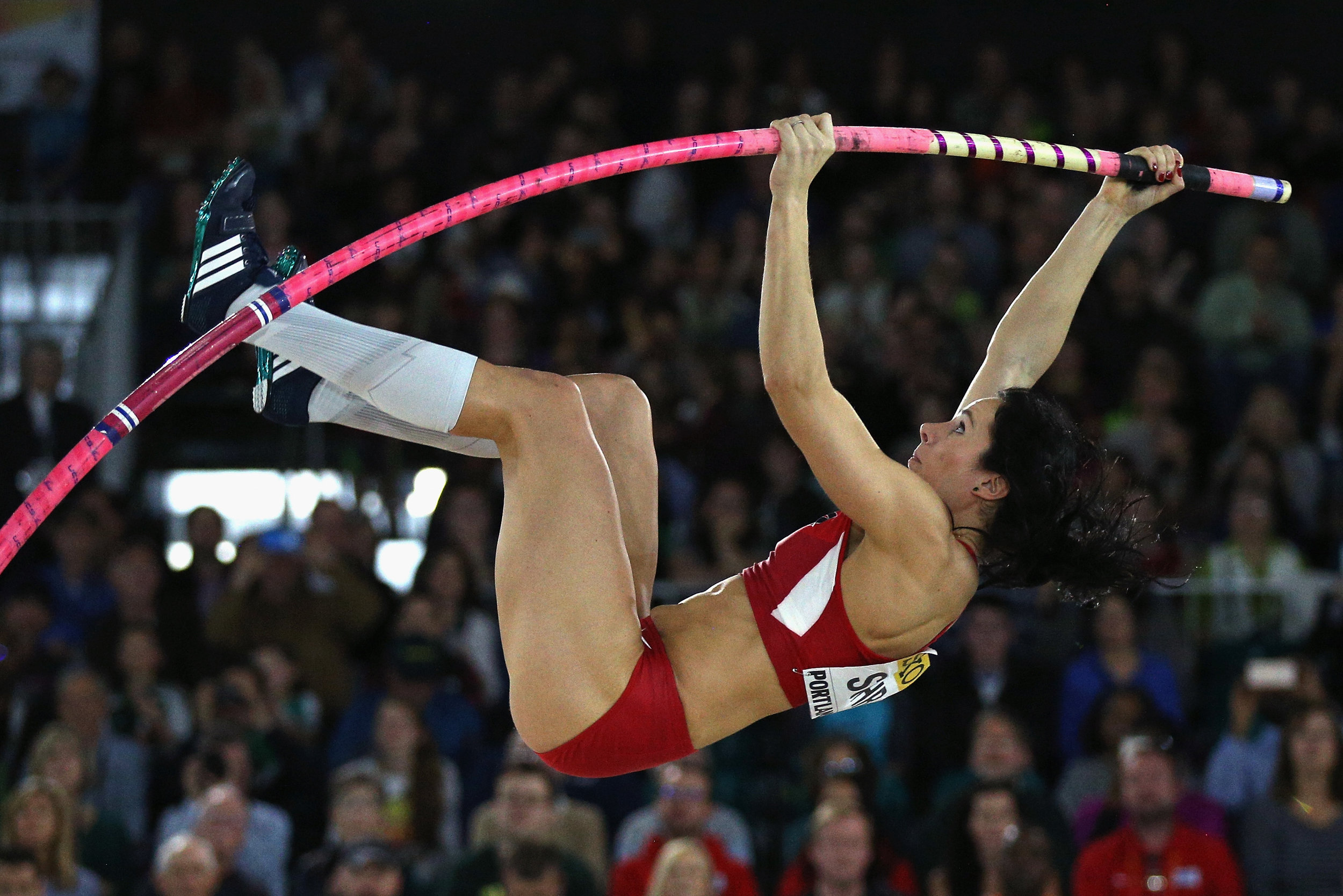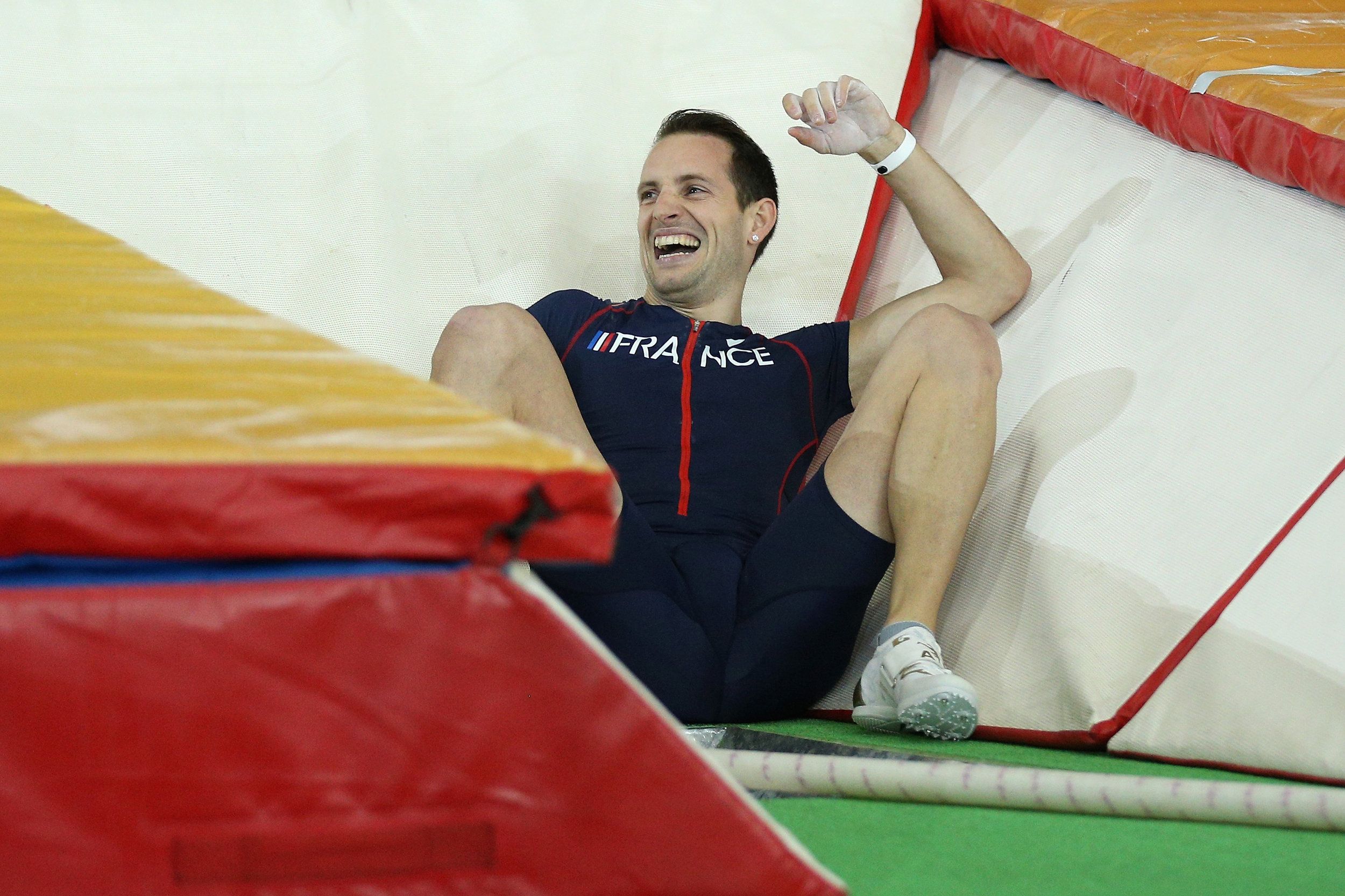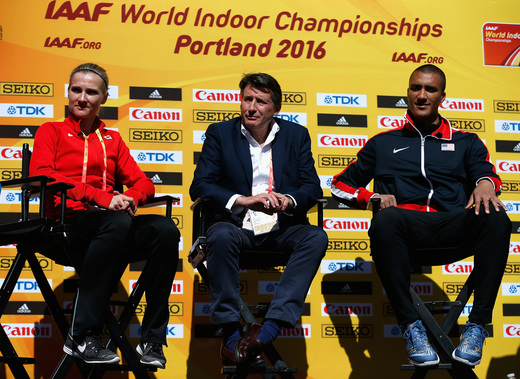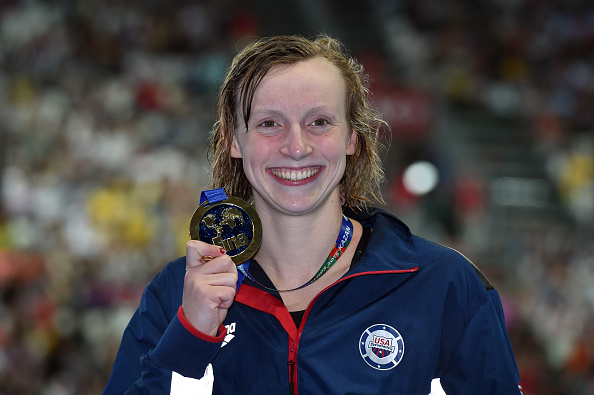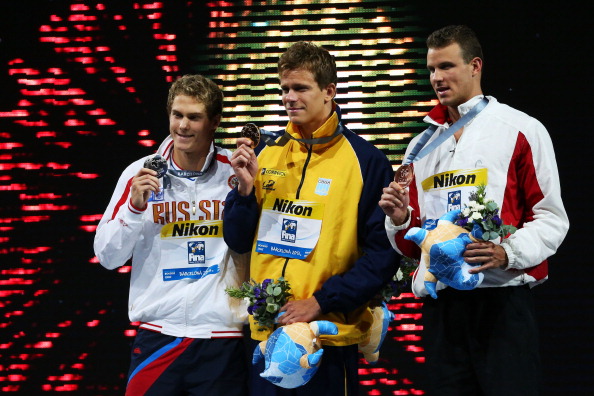KAZAN, Russia — Bobbing in the warmup pool before the start of Tuesday night’s finals, a black-and-red swim cap bore this declaration: “Your own worst enemy is your fear.”
For years and years, swimmers from other nations — even if they didn’t want to admit it and would never say so in public — feared the mighty U.S. swim team. This 2015 world championships is only three days old, and there is plenty of racing to go, but one thing, more than anything, is already clear: the fear is gone.
The rest of the world has for sure caught up to the United States.
Indeed, swimmers from other countries have proven themselves better than the Americans, and in a number of disciplines, a dramatic trend that has emerged as the No. 1 story at Kazan 2015, and could hold significant consequence for next year’s Rio 2016 Olympics.
On Monday, the U.S. went medal-less in three finals.
On Tuesday, American swimmers came up empty in the men’s 200 freestyle — Ryan Lochte, fourth — and the women’s 100 backstroke — Missy Franklin, fifth, and Kathleen Baker, eighth.

The Americans did salvage one non-Katie Ledecky medal — Matt Grevers’ third-place in the men’s 100 backstroke. Grevers had been the defending champion in the 100 back from Barcelona 2013 and the London 2012 Games.
His bronze marked the first medal of the meet for U.S. men.
The 18-year-old Ledecky has stamped herself at these championships as the No. 1 swimmer in the world. Zero question. Every race is a chance at a world record.
On Tuesday night, Ledecky demolished the world record in the 1500 free final that she herself had set in the prelims the day before.
Monday: 15:27.71.
Tuesday: 15:25.48, 2.23 seconds faster. She won the race by more than 14 seconds over Lauren Boyle of New Zealand, 15:40.14.
That made for her ninth world record — in the 1500, 800 or 400 — since 2013. Ninth!
Ledecky’s stats verge on the outrageous.
Her time Tuesday is a full 24-plus seconds under the qualifying mark for U.S. men for the 2016 Olympic Trials, 15:49.99. A Belgian journalist, Philippe Vande Weyer, who knows the Olympic scene well, said on his Twitter feed that Ledecky’s time Tuesday would have won the Belgian men’s championships by 52 seconds.
Some 29 minutes after the 1500 final, Ledecky was back into the water for a punishing double, bidding to qualify for Wednesday night’s 200 free final. Eighth at 100, seventh at 150, she raced the last 50 meters hard, finishing third in her heat for the sixth-best time over the two semis, 1:56.76.
Franklin advanced as well, with the second-best time, 1:56.37.

Of the 1500, Ledecky said afterward, she thought during the race about both her grandfathers, both passed away, mindful that her two grandmothers were “watching carefully” back home: “I thought about my grandpas at one point in the race, and dug deep.”
Before the 200, she said, her “legs kind of felt like jello,” surprising because, as she said, “I barely kicked in the mile,” what swimmers call the 1500.
Jello, for those intrigued by what someone with Ledecky’s cool uses for fuel, had not been on the menu beforehand. At noon, she’d had pesto pasta, rice, green beans and some bread. At 2:45, more pasta: “I always have pasta before a final.”
In the 200, she said, “I dove in and my arms felt really really sore and my legs felt better than my arms, so I knew I had to kick. I toughed my way through that race and I couldn’t be more pleased with how that went.”
She also said of her brutal double and world-record 1500 swim, “I wasn’t afraid to fail.”
The U.S. medal count after three days: four, two gold, two bronze.
Ledecky has both golds: the 1500 and 400, which she won Sunday in setting a meet (but not world) record. The bronze medals: Grevers and the women’s 4x100 relay team.
Great Britain and Australia lead the medals count, each with five.
Britain’s emergence offers emphatic proof of how the world has changed. At the Barcelona 2013 worlds, the British won one medal, a bronze.
You have to go back to 1986, and the days of Communism, to find a swim worlds in which the U.S. did not win the overall medal count. That year, the East Germans won, with 30; the Americans came in second, with 24.
There is zero doubt that over the decades the U.S. has been the dominant power in world championships swimming. Coming into Kazan 2015, the U.S. had won the most medals (and by far), with 418; Australia had 152. Same goes for the gold-medal count: U.S. 231, Australia 58.
The Americans’ real edge has come in world championship years the year before an Olympics. See, for instance, 2011 Shanghai (29 medals, 16 gold); 2007 Melbourne (36 medals, 20 gold, as Michael Phelps geared up for Beijing 2008); Barcelona 2003 (28 overall, 11 gold).
Phelps is not in Kazan as part of the fallout from his drunk-driving case.
Meanwhile, evidence of how much better the rest of the world has become was all around Tuesday:
— Seven world records have already been set at Kazan 2015, bettering the mark set by the end of Barcelona two years ago, where there were six. Ledecky has two; the rest of the world, five.
— Before Tuesday, no female swimmer from New Zealand had ever won a gold or silver at the worlds in any event. Boyle and Zoe Baker had been the only women from New Zealand to win a worlds medal — bronze, five in all. Boyle’s silver in the 1500 made for a first.
— In Tuesday morning’s prelims of the men’s 50 breaststroke, South Africa’s Cameron Van Der Burgh broke the world record. At night, Britain’s Adam Peaty — in the first of two semifinals — lowered it again, down to 26.42.
American Kevin Cordes set an American record in the semis, 26.76. Peaty, in the next lane, went a full three-tenths faster over a mere 50 meters.
Peaty, afterward: "The morning swim was easy, and I knew this was just the 50-meter race, not my main event," the 100, which he has already won here, "so I didn’t have any pressure. This made this semi also really easy for me."
— The top three in the men’s 200 free: James Guy of Britain, 1:45.14; China’s Sun Yang, 1:45.20; Germany’s Paul Biedermann, 1:45.38.
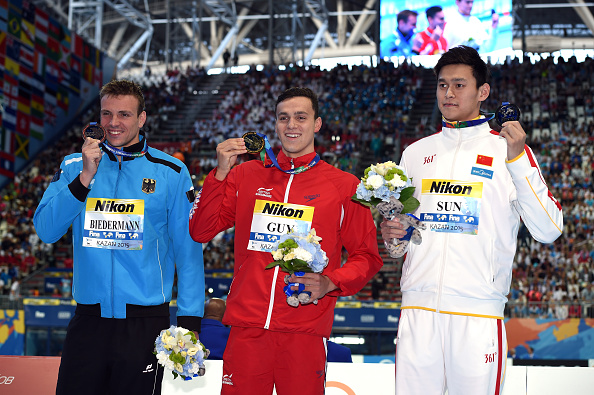
Guy’s victory not only denied Sun the chance for a four-peat: the 400 (which Sun won on Sunday), as well as the 800 and 1500, in which he is a strong favorite.
The win also established Guy as one of the middle-distance favorites for 2016. He took second, behind Sun, on Sunday in the 400.
Guy is 19 years old, and will now hold forever the distinction of being the first British male ever to win a worlds freestyle title. He said of winning, “I’ve never thought I could reach that -- beyond making the final. With so many great swimmers around, Chad [le Clos] ... Ryan, Sun who are my idols … My tactics were just swim my own race, concentrate on myself and that worked.”
For his part, Lochte’s fourth matched the fourths he registered in the 200 from Barcelona 2013 worlds as well as the London 2012 Olympics in the 200 free. He said afterward he just needed to train harder.
— Grevers' third-place Tuesday, in 52.66, came in a tight race. He finished behind Mitchell Larkin of Australia, 52.40, and Camille Lacourt of France, 52.48.
Grevers, after: “I’m very surprised I lost the back half of that. That’s not how I train. I train to finish. I don’t train to die. I practice living, not dying. So dying there was very disappointing.”
— Franklin is the gold medalist in the 100 back at London 2012 and Barcelona 2013 (as well as gold medalist in the 200 free two years ago). On Tuesday night’s in the 100 back, she managed 59.4, more than a second behind winner Emily Seebohm of Australia, 58.26. Second, another Australian, Madison Wilson. Third, Denmark’s Mie Oe Nielsen. Fourth, China’s Fu Yuanhui.
Franklin said, “I have literally done everything I could have possibly done the past two months to be prepared for this meet. No excuses. I was at 59.4 and that’s obviously where I am right now.”
— Here was the field for the women’s 100 breaststroke final: Italy, Japan, Jamaica, Russia, Lithuania, China, Sweden and Iceland. Jamaica! Iceland!
Russia’s Yulia Efimova won the race, in 1:05.66, and Kazan Arena rocked hard a few minutes later as the crowd sang the national anthem.
It’s well-known in swim circles that Efimova trained in Los Angeles, at USC. Iceland’s Hrafnhildur Luthersdottir trained in Florida, at Gainesville.
This sort of thing has been going on for years and years, and it’s not going to change, nor should it — athletes from all over the world coming to the United States for opportunity.
At the same time, a variety of factors might explain why the Americans find themselves looking up at the end of races and not finding the familiar “1” next to the red, white and blue:
— Phelps isn’t here. He’s not only the best swimmer in U.S. history but had emerged in recent years as a genuine team leader.
— The Americans have long had a disdain for non-Olympic events such as the 50 sprints (everything but free: fly, breast, back) and new events such as mixed relays. The conversation should be had, and soon, about whether that focus deserves intense review.
Outside of Nathan Adrian, it’s hard to pick anyone in the U.S. sprint program who seems like a sure lock for a medal, men or women.
— The U.S. team for Kazan 2015 was picked a year ago. There were athletes who raced at the recent Pan-American Games in Toronto who should have been here, and vice-versa.
Such a selection policy deserves, again, review.
— And, perhaps most of all, there’s the fear factor. Or, better, the lack of it.
Tyler Clary, the 200 backstroke gold medalist from London 2012, finished 12th in the 200 fly semifinals Tuesday, an event in which one American — Tom Shields, eighth — qualified for the finals.
For years, Phelps ruled the 200 fly. Now, until proven otherwise, le Clos is the man. The South African turned in a solid second-place effort in Tuesday’s semis, behind Hungarian veteran Laszlo Cheh.
Clary said after the race that, big picture, Kazan 2015 ought to be considered a “rehearsal” for Rio 2016, that results here “ought to be taken with a grain of salt.”
He said, “Regardless of what the medal counts might look like, and we’re not having the most excellent meet Team USA has ever had … at the end of the day, all that matters is how we do next summer.”
Asked if the rest of the world had caught up with the Americans, Clary said, “I can agree with that.”
The next question — did swimmers from everywhere else no long fear the mighty Americans?
“It’s not my place,” he said, “to comment on the psyche of other swimmers. Maybe, maybe not.” He paused. “They certainly don’t swim like it.”




